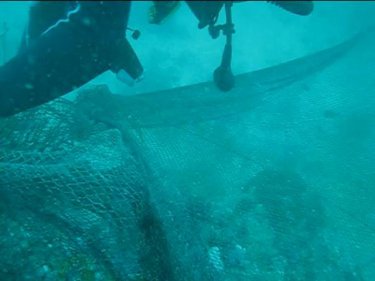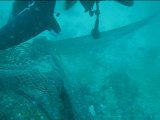Phuket region divers are calling for action to end illegal smuggling and fishing abuses that threaten Phuket's dive tourism.
Tomorrow two boats will anchor over Shark Point, a marine park area in Phang Nga Bay, east of Phuket, as divers cut the reef free from the net.
Local authorities fail to protect Thailand's underwater treasures from illegal fishing and poaching.
Renegade marine park rangers have even been accused recently of taking corrupt payments from tour operators.
The huge net recorded on a video at Shark Point strangling a reef is likely to raise even greater alarm as the future of Thailand's diving tourism continues to be threatened.
Friday's Shark Point rescue project, involving 20 professional divers, is being mounted by Go Eco Phuket with help from Sea Bees Diving and Similan Queen.
''The net is new and has not been on Shark Point for a long time which is why we want to get to it as soon as possible, to remove it before it causes more damage,'' Kerry Leach, spokesperson of Go Eco Phuket, said today.
Divers who shot the alarming video over the coral just days ago said the fishing trawler's net appeared to have been snagged and dropped over a large area of the beautiful reef.
Agitation by the dive industry has failed to produce a reaction from local authorities but images of what's happening under the water, posted on YouTube and other social network sites, will rapidly turn tourists off Phuket and the Andaman coast.
Divers will go to regions where the coral reefs are protected because that's where they are most likely to be swimming among marine life.
Fishing in marine parks quickly decimates the coral fish and other creatures and kills tourism.
Go Eco Phuket member Joe Blasy, who has been diving Phuket waters for more than 12 years, is just one of many Phuket region divers who want the attitudes of authorities to change.
"This is really sad to see,'' he said.
''The problems caused by destructive fishing habits in Thai waters seems to be getting worse. We can see from the video that already some coral has been damaged.
''This is not an isolated incident. A huge patch of staghorn coral near Koh Boo off Kata Beach has been destroyed recently.
''Only fishing boats drag-netting, also called trawling, can inflict damage on that kind of scale.
''Every November when the Similans National Park opens back up for diving, trawlers nets can be found all over the reefs there.''
This year, in an apparent attempt to gain extra revenue, the Similans will reopen two weeks earlier.
Renegade rangers there have been accused of taking corrupt payments from tour operators and doing nothing to prevent illegal fishing.
''It is well known in the diving industry that while the dive boats are away, the fishing boats enter in great numbers as the park rangers look on and do nothing,'' Mr Blasy said.
''On Phuket, we also have seen local fishermen laying out gill nets directly on top of Kata house reef.
''This is not only illegal, it is incredibly damaging to the reef ecosystem as gill nets kill everything which gets caught in them, including protected turtles, sharks, and rays."
The problems are not just limited to fishing nets, Mr Blasy says.
''On the reef around Coral Island we have found large fish cages sitting directly on the reef which are full of exotic reef fish.
''Just last month I found one with Emperor Angel Fish, Moorish Idols, Pufferfish, and other reef fish in it.
''These fish are worth more on the illegal underground aquarium fish trade which flourishes in Bangkok than they are at the local fresh fish market.
''These traps are secured to the bottom by several large rocks placed around their base. The traps have no surface marker on them, which keeps them hidden.
''This differentiates them from other traps which are usually smaller and have a float attached enabling them to be recovered by boats from above. We figure these traps are emptied out of valuable fish periodically by poachers either freediving down to them or using makeshift 'hookah' supplied air systems.
''We believe these traps are specifically designed to covertly catch protected exotic reef fish which are then being sold, illegally, into the aquarium fish trade in Bangkok.
''We know this is going on because we see the occasional arrest of exotic reef fish smugglers on Phuket. No doubt these arrests represent the tip of the iceberg.
''What we aren't always sure of is how exactly they are doing it, and unfortunately at the moment there isn't much political will to address it."
Stronger regulations are needed, as well as more enforcement, Mr Blasy said.
''The law alows for a 100,000 baht fine or five years in jail, or both. But there is little to no enforcement of the laws, and our efforts are further
hampered by corruption and loopholes in the laws.
''People will claim the captive animal is not from Phuket waters. It is, of course, difficult to prove otherwise.''
To become involved with Go Eco Phuket, visit their Facebook page.
























I am saddened to read this article. It is only 3 months since I dived with my sister on Shark Point & we were delighted to find that after a prolonged absence, there were several of the beautiful Leopard Sharks returned.
It is one of the best dive sites off Phuket, but now it appears it may be badly damaged. The authorities (police or navy) need to patrol & take action or there will be nothing left to dive on.
Posted by Logic on July 11, 2013 14:14